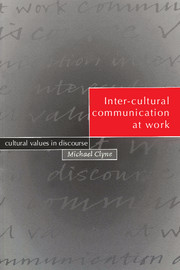Book contents
- Frontmatter
- Contents
- List of figures
- List of tables
- Acknowledgements
- 1 Introducing the field
- 2 Setting up the project
- 3 Speech acts in inter-cultural discourse
- 4 Variation in communication patterns and inter-cultural communication breakdown in oral discourse
- 5 Written discourse across cultures
- 6 Towards a linguistics of inter-cultural communication
- 7 Some theoretical and practical implications
- Appendix 1 Non-key informants
- Appendix 2 Index of informants' pseudonyms, ages, and ethnolinguistic background
- Appendix 3 Two long transcriptions
- References
- Index of text transcriptions
- Index of names
- Index of subjects
6 - Towards a linguistics of inter-cultural communication
Published online by Cambridge University Press: 05 June 2012
- Frontmatter
- Contents
- List of figures
- List of tables
- Acknowledgements
- 1 Introducing the field
- 2 Setting up the project
- 3 Speech acts in inter-cultural discourse
- 4 Variation in communication patterns and inter-cultural communication breakdown in oral discourse
- 5 Written discourse across cultures
- 6 Towards a linguistics of inter-cultural communication
- 7 Some theoretical and practical implications
- Appendix 1 Non-key informants
- Appendix 2 Index of informants' pseudonyms, ages, and ethnolinguistic background
- Appendix 3 Two long transcriptions
- References
- Index of text transcriptions
- Index of names
- Index of subjects
Summary
Opening remarks
In Chapters 3, 4, and 5, I reported on data concerning areal variation in the use and expectations of discourse patterns (speech acts and their sequencing in complex interactions, turn taking, organization of discourse). It appears that this is attributable to cultural differences, with the styles of specific cultural groups being more or less typical of areal styles A, B, and C. This applies to written, as well as to spoken (workplace), discourse data which provide the focus of this monograph. In this chapter, I will first examine some of the discourse features in relation to the cultural values systems of their cultural groups, based on the work of others, utilizing especially the framework of Hofstede (1984, 1991). It will be recalled from 1.3.8, that Hofstede's four parameters are – power distance, individualism (vs. collectivism), masculinity (vs. femininity), and uncertainty avoidance. Then I will suggest some parameters determining cultural values in discourse itself. I would like to stress that this is intended not to create or reinforce stereotypes in the evaluative sense but to explain the tendencies in our data in each culture's own terms. Finally I shall ‘revisit’ the Gricean maxims and attempt some revisions of them in the light of our data and of the parameters proposed and the cultural values discussed. Some other models (e.g. Brown and Levinson) will also be included in the discussion.
- Type
- Chapter
- Information
- Inter-cultural Communication at WorkCultural Values in Discourse, pp. 176 - 201Publisher: Cambridge University PressPrint publication year: 1995

